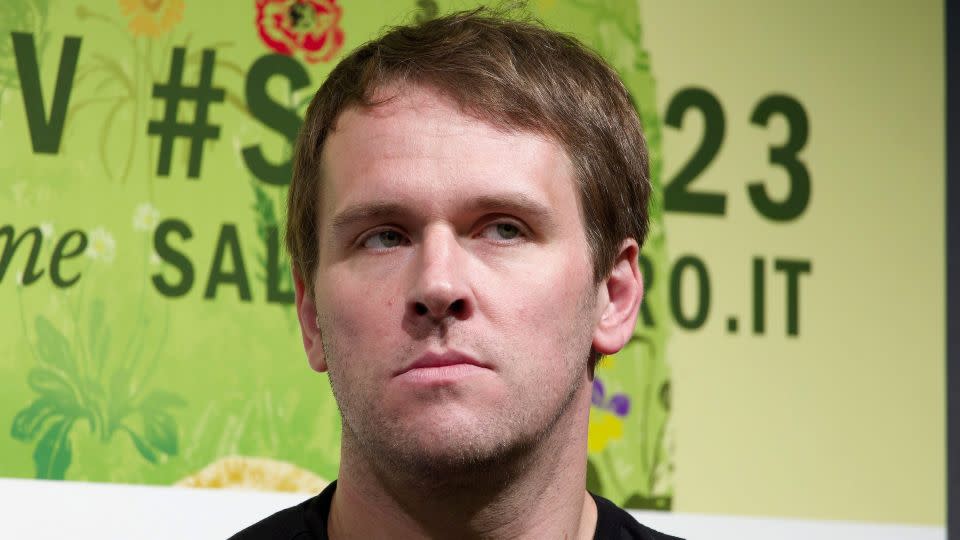Opinion: A husband’s controversial remembrance of his wife left me with profound questions
- Oops!Something went wrong.Please try again later.
- Oops!Something went wrong.Please try again later.
Editor’s Note: Patricia Grisafi, PhD, is a freelance writer whose work has been featured in The Guardian, Salon, NBC, Los Angeles Review of Books, The Mary Sue, The Daily Dot and elsewhere. The views expressed here are her own. Read more opinion on CNN.
Who has the authority to write about the dead? The question is often reserved for celebrity exposes — tawdry digs into famous peoples’ addictions, quirks and proclivities in the bedroom. But with the recent publication of Blake Butler’s genre-defying book “Molly,” the question has shifted to how much should be revealed — especially because the subject is Butler’s wife, the writer and baker Molly Brodak, who died by suicide in 2020.

I read “Molly” in a breathless weekend while entertaining my young children, so I spent a lot of time in the bathroom screaming “PRIVACY PLEASE” which became symbolic of the struggle taking place in the public conversation about the book. As I sat on the tiled floor against the claw-foot tub, I thought about whether anyone can truly be known, even to themselves.
Where some people saw in “Molly” a gross violation of privacy, others saw grace and bravery, a willingness to make a “clean breast of it” as Arthur Schopenhauer famously wrote to Johann Wolfgang von Goethe. Butler had laid bare Brodak’s complex self, her joys and her transgressions without permission from a beloved no longer here to grant it. Had he violated her memory by doing so?
In what seems almost a willful distortion of the humanity of Butler’s portrayal, social media users excoriated the book, some clearly without reading it. “Watching everyone celebrate what amounts to literary revenge porn against a mentally unwell woman who took her own life has me sick to my stomach,” one writer posted on X.
Then there were the tabloids. They went right for the salacious stuff. The Daily Mail decided that it was important to emphasize that Brodak had sex with other people while she was married: “Famous poet Molly Brodak had a secret life as a ‘serial cheater’ who had affair with a student days after her wedding to author husband—and he only found out while preparing slideshow for her funeral after her suicide,” read the headline.

Writers usually don’t receive the tabloid treatment, so “Molly” had ruffled feathers enough — something Butler told me was unexpected and grotesque. “I was shocked when the first tabloid hit. I was furious,” he said.
But if some people considered “Molly” to be a hatchet job on Brodak, I couldn’t find the hatchet. I couldn’t even find malice, just gaping bewilderment and circles of grief.
In the book, both Molly and Blake come across as flawed — this is not a work that sets the author up as a paragon of virtue and his subject as a she-devil. The real adversary is beyond both Molly and Blake’s grasp: “My enemy is silence,” Butler says, explaining he wanted to help end the generational trauma and abuse that plagued Brodak, not sensationalize her.
He read widely while writing the book, especially the work of Annie Ernaux, trauma memoirs and Holocaust memoirs, as Brodak’s father — who later became a bank robber, as Brodak detailed in her own memoir, “Bandit” — had been conceived in a concentration camp. Brodak later visited the site of the camp while working on a book called “Alone in Poland.”
Brodak was a voracious reader and intellect who revisited Sylvia Plath’s work before she died. I couldn’t help but draw connections between the two women’s posthumous treatment by the literary men in their lives. When Plath died by suicide in February 1963, she left a finished poetry manuscript on her desk. “Ariel” eventually ended up being a posthumous canonical work, a revolutionary expression of female rage and stunning lyricism.
But the collection that was initially published was not Plath’s intended version. Her husband, Ted Hughes, had edited the book’s arrangement and eliminated poems that painted him in a less than flattering light.
When the restored version of “Ariel” was later published in 2004, readers were finally able to see Plath’s full vision — a poetic journey that ended on the line “The bees are flying. They taste the spring,” instead of “While/From the bottom of the pool, fixed stars/Govern a life.” The original version was a narrative of rebirth; Hughes’ version was one that leaned into a bleak vision of suicide, this robbing Plath of literary agency and imposing his own mythology on her. As if that wasn’t egregious enough, Hughes claims that he “destroyed” Plath’s last journal so it could not be read.
Butler didn’t want to do that to Brodak. “I would never want to control her legacy,” he told me. “I don’t want people underestimating her as an artist. I honor her as an artist, it’s been my goal from the beginning to make sure her work has a place in the conversation.”
In a search for authenticity, Butler turns to passages from her journals that allow a spontaneous look into Brodak’s thoughts. He also quotes Brodak at length from her own poetry and her memoir. He includes her suicide note.
Most significantly, he includes the last poem Brodak wrote, a stark meditation called “Camp,” referencing both the Holocaust and a child’s summertime rite of passage. In the book, Blake refuses to comment on the poem except that poetry had always saved her life, was “the only way she’d ever found to speak her truth.”
In the book, Butler reflects on the conundrum of keeping Brodak’s privacy: “I’ve despaired over sharing these darker parts of Molly, the parts she hated herself for, and used against herself like cutting. Even writing it feels like transcribing a secret meant for silence. Should I be allowed to make this said? To bring to light a part of Molly’s story she covered over at any cost?”
The uneasy answer Butler arrived at was yes — and “Molly” transcends because of this. Brodak comes across as alive on the page, a glimmering Gordian knot. She is determined to be heard but unable to find truth. She is multiplicity, fragmentation personified. Butler’s elegiac and philosophical excavation of her life is at times hard to read but it’s also hopeful — a protest against silence and the kinds of stories we tell about the dead.
If you or someone you know is struggling with suicidal thoughts or mental health matters, please call the 988 Suicide & Crisis Lifeline by dialing 988 to connect with a trained counselor, or visit the 988 Lifeline website.
For more CNN news and newsletters create an account at CNN.com

